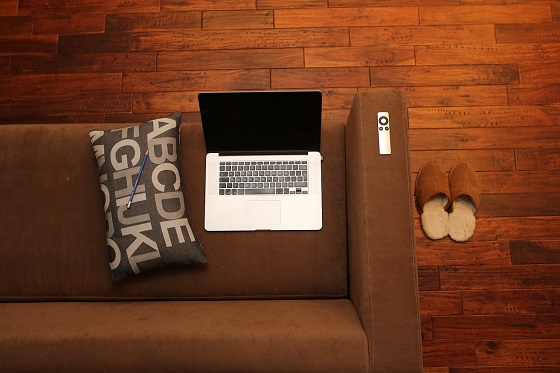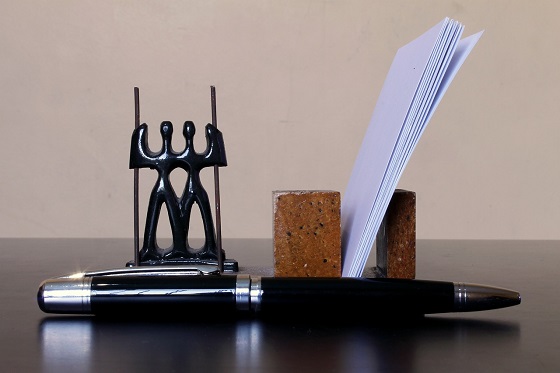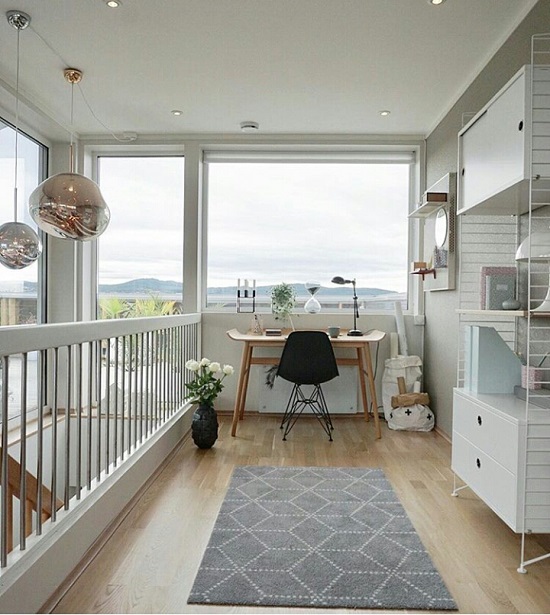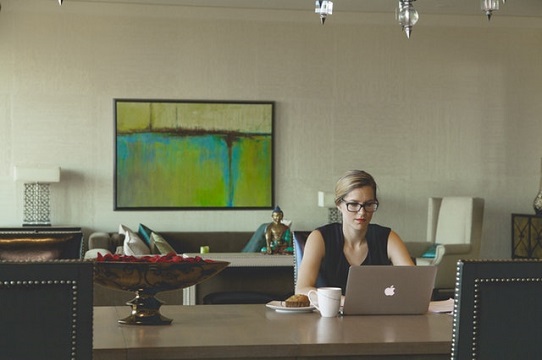If you work from home as a freelancer, blogger, or you run your own business; it can be a challenge to stay motivated and ensure that you’re being productive during the working week. There are plenty of distractions and potential disturbances in a home setting; from other family members to odd jobs and chores that need to be done. It can be difficult to make sure that a short break doesn’t turn into something longer, and before you know it; it’s the evening and time for dinner and bed.
However, creating a productive workspace and home-office will help to boost your work and make each day more advantageous. Therefore, it’s worth spending some time and effort making your office, studio, or work area the best it can be, and investing in changes and upgrades for a fruitful future. The following are some ideas and tip for those whose home office space, and work routine, needs a push in the right direction for added productivity.

Image source: https://www.pexels.com/photo/blur-bottle-bright-building-273238/
The Decor
Your office should be a space where you can clear your mind and separate yourself from the rest of the house; you need to feel cool, calm and collected so that you’re ready to tackle your workload. Therefore, you’ll need to invest in a fresh coat of paint for the walls and ceilings, and ensure that it’s in a light, neutral hue, or even a cool, crisp white. A non-invasive background colour will help prevent brain-fog and headaches, and your thoughts will be able to run freely so that you can boost your productivity. You’ll also be able to add decorative touches, like artwork, ornaments, and photographs with ease, and the environment won’t appear to be too cluttered; which can also stifle your thought process.
When it comes to flooring; you need to think about practicality and design. The colour doesn’t have to be a light shade to match the walls; however, the more neutral, the better. You want to be able to incorporate your office furniture with ease and ensure that any rugs or mats you want to add will fit in seamlessly. A hard-wearing floor, like wood, laminate, or tiles, will ensure that your office or work nook won’t look tired from wear and tear over the years. If you’re working full time from home; the space will be a heavy traffic area, both from you moving around the area, and your office chair rolling to and fro, so you’ll need something that withstand the test of time and usage.
There are plenty of options to suit every style and taste when it comes to desks, office chairs, and furniture. If you’ve kept your walls and floor neutral; you’ll be able to incorporate a wide variety of items, whether they are antique family heirlooms or fresh, modern pieces that you’ve treated yourself (and your new office) to.
It’s worth adding plenty of storage and seating into your space, without making it feel cluttered. An armchair or small sofa makes the perfect addition to a home office; you can sit and use your laptop or tablet on there, or take a coffee break without having to back into your living area where there’ll be plenty of distractions. It’s always great to have multiple seating options; it’ll give you flexibility and comfort in your workspace, and you can figure how you like to work best. Make sure that your storage, like your shelving and drawers, are all easy to access and fill them with items that you’ll utilise each day. Don’t overcrowd your storage or give yourself too much to look at when you’re at your desk; keep everything as minimal as possible, so your mind will have room for all the work ahead.

Image credit
The Layout
When it comes to the layout of your office environment; You need to focus on the feeling of openness, space, and how easy it is to maneuver around the room. Therefore, it’s important that you don’t buy a desk, or any other furniture, that would overwhelm the office. Place your shelving and storage in nooks and corners of the room: if they’re not a feature of your workspace, you don’t need them to be in your line of sight, and you can tidy things away so that you have a clear and productive room to work in. You could consider putting your desk facing towards a window; natural light is a great boost for the brain and will allow you to think clearly, and you’ll get a boost to your mood.
Although you don’t want it too big; make sure that your desk can house your computer, laptop, and all of your stationery comfortably. You’ll want to have everything close by, without it feeling claustrophobic or untidy. Take away any heavy curtains or blinds, and fill the room with natural light and fresh air when possible; the sunlight should bounce off the light wall colours and fill the space with a lively feeling that will boost your ability to produce quality work. If you do decide to bring in comfy seating and a rug or two; pop them in corners and nooks too. You want your desk space to feel open and vibrant; however, you might want you chill-out zone to feel separate and cosy.
A large wall mirror can open up your office room; put it in sight of where you sit at your desk so that you can always catch a glimpse and get the feeling of a larger work environment. Keep you filing and paperwork in the storage you popped in the corners and along the walls; these are things you don’t need to look at every day, but you’ll know where to find them should you need to. Again, it’s not about over-filling the room, but carefully placing your items and furniture so that they’re accessible and make the most of the size you have to work with. Your layout should boost the feeling of space and function in your office so it can increase your motivation and the momentum of the work you’re producing.
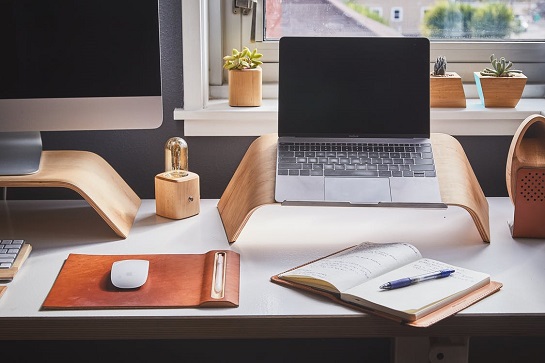
Image via here
The Organisation
Maintaining a productive office is key to the success of the work you produce at home. Make sure you have your lists and calendar not only digitally, but somewhere written down, and insight too. Writing down notes and putting them where you can see them is a great way to keep on top of tasks and work that needs to be completed. Keep your vital contact details, like mobile computer repairs, clients, and stockists written down physically too; you’ll be grateful you did so if anything happens to your computer, phone, or laptop. Backing your work up on more than one USB is another great way to ensure everything you’ve worked on is safe, and nothing gets lost. Back-up regularly to avoid a month’s work disappearing due to a computer crashing.
It’s worth investing in a safe, lockable drawers or a cabinet, to ensure that your expensive items are at risk of family life, or theft. Put any cameras, laptops, tablets, and USBs that you purely use for work, in the secure, lockable storage and give yourself some peace of mind when you close the door to the office each day. Clever storage solutions and an organised approach to your space will ensure that your focus will be on your work, so put some time and effort in now to reap the rewards in the future.

Image from PEXELS
The Personality
Now that you’ve painted, decorated, added the right furniture and put it in a great place, and you’ve organised everything you need for a productive day of work; you can focus on the fun stuff. You’ve decorated the interior of your home office with neutral and plain shades; therefore you can bring in pops of colour and inspiration in the form of books, your favourite artwork, interior accessories, and photographs of your loved ones and places you’ve enjoyed. Brightly coloured and patterned cushions and throws are a great addition for your chill out zone, or to make your office chair a little more comfortable. Soft furnishings are always a great way to switch up a room’s style without spending too much money, so as your tastes change; so will your office.
House plants and fresh flowers in your favourite pots and vases are another way to add colour, and you’ll be bringing in a natural element which is great for calming the mind and helping your thought process. Treat yourself to an office mug, or cup and saucer from a ceramic designer you admire; you want the room to feel personal and special so that you can be creative with your ideas and comfortable enough to sit and work hard. Coasters, stationery holders, and photo frames will all add interest and characterful design additions to your desk space. Remember not to over-clutter the space, but don’t leave it soulless and free of your personality.
The more effort you put into each detail of your home-based office, the more you’ll be comfortable, organised and inspired, and your productivity will increase immediately.






